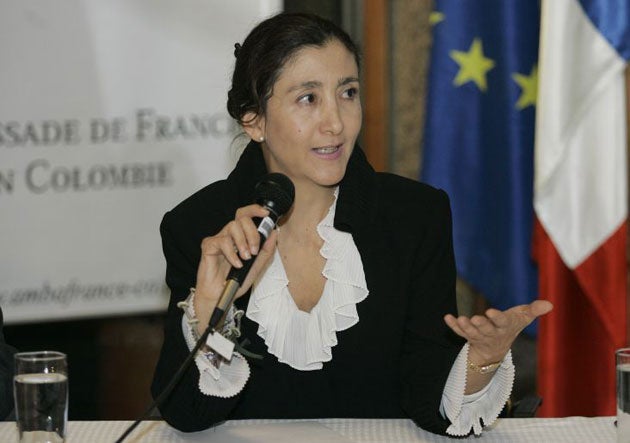Betancourt back in Bogota
Shock appearance under heavy guard after death threats to former hostage

The rescued Farc hostage, Ingrid Betancourt, made an unexpected re-appearance in Bogota at the weekend for the first time since her dramatic escape from the ultra-leftist Colombian guerrillas in July. Ms Betancourt, 47 – who denied as recently as Friday that she planned a return to Colombia – appealed for renewed political and diplomatic efforts to free the hundreds of hostages still held by the guerrillas in jungle camps.
She apologised for failing to take part in marches to demand the freedom of the hostages in Bogota on Friday, suggesting that it would have been unsafe for her to do so. Her itinerary, which will take her to several Latin American capitals, is being kept secret because she has had threats against her life, she said.
Ms Betancourt, a former presidential candidate who has dual Colombian and French citizenship, was freed from six years of captivity in July in an elaborate sting operation by the Colombian armed forces. She has since spent all of her time in Europe, making pilgrimages to Lourdes and the Vatican and apparently distancing herself from the support groups set up to campaign for her release.
French newspapers have carried stories suggesting she has upset members of these groups by suggesting that she no longer wished to be an active figurehead for their continuing campaign on behalf of the prisoners held by the Revolutionary Armed Forces of Colombia (Farc).
On Friday, Mme Betancourt told journalists that her son and daughter feared for her safety if she returned. These comments now appear to have been all part of a ruse to keep her movements secret. She will be transported in armoured cars and be escorted by more than 20 bodyguards while in Colombia.
Ms Betancourt met the Colombian President, Alvaro Uribe, on Saturday night. At a press conference, she said that she saw herself as "neither a mediator nor a facilitator" in the efforts to free the hostages. But she said she intended to press for renewed pan-American pressure on both the Farc and the Colombian government to unblock the situation.
She will visit Ecuador, Brazil, Argentina, Peru, Chile, Bolivia and Venezuela this week and Mexico before the end of the year. Ms Betancourt went out of her way to praise the left-wing Venezuelan President, Hugo Chavez, who has been criticised in Colombia for his contacts with the Farc. She said she had an "immense admiration" for President Chavez. She added: "It is important that we can keep counting on [Latin American capitals] to help us look for a way, an opening, that will allow for the liberation of those who remain behind. Contacts are frozen and a way has to be found to reach the Farc."
Ms Betancourt said she had carried a letter from the French President, Nicolas Sarkozy, in which he promised to continue his efforts for the hostages, and to give asylum in France to a guerrilla who escorted a hostage to freedom last month.
Uncertainty still surrounds the complex operation mounted by the Colombian authorities which released Ms Betancourt, three American engineers and 10 other hostages in July. Although presented at the time as a daring sting operation by Colombian commandos, other reports have suggested that this was mostly a cover for a planned defection by a group of Farc rebels.
She told the media she was delighted by Barack Obama's victory in the US elections last month but added: "I'm not sure that Obama knows much about Latin America," she said, grinning. "But I have the hope that President Obama encounters in Latin America interlocutors who open his heart."
Ms Betancourt declined to say whether she thought that the new administration should continue the high-level of US military aid to Bogota. The Colombian government insists that this has been the critical factor in recent successes against the Farc, including the casualty-free operation which rescued Ms Betancourt on 2 July. Asked whether another such operation could succeed, she said: "Taking into account the situation of my comrades [the remaining hostages], I think a military operation would have a bloody outcome."
Join our commenting forum
Join thought-provoking conversations, follow other Independent readers and see their replies
Comments
Bookmark popover
Removed from bookmarks